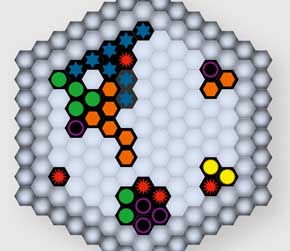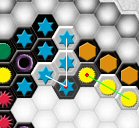AXIO
Il gioco
The aim of the game is to score as many points as possible in each of the six colors. It is particularly important to ensure that all colors are represented as evenly as possible, because in the end the color that has the fewest points is decisive.
Tavolo di gioco

The size of the playing field depends on the number of players: with two players only the inner, light part is used. With three players the light gray border is added, with four players the entire playing field counts.

It is located at the top right the score track of all players. The number of points is both graphically represented by the length of the color bars and displayed numerically above it.
Svolgimento
Each player Always has six stones in stock at the start of each round. Stones laid out are automatically refilled at the end of the turn.
The players now take turns taking a stone from their supply and placing it on the playing field. To do this, click on a stone in the selection, rotate it with the right mouse button if desired and then place it on the playing field, again with a click. If you want to change your mind again after selecting the stone, simply click on another stone from the selection.
In the first round, every player has to place it on one of the starting stones that no other player has yet placed on. After the first round, the placement position is free.
Every stone placed is scored immediately.

Each stone placed is scored Half of the stone looked at separately: for each hexagon of the same color that borders the placed stone in a straight line, you get one point.
In the picture the blue-yellow stone was placed ( marked with two red dots). The yellow stone now gets two points (green line), the blue one three points (two points up, one to the left).
 < p> The lower double orange stone was placed here. The right part of the stone now receives four points (purple lines), the left part of the stone two points (green line)
< p> The lower double orange stone was placed here. The right part of the stone now receives four points (purple lines), the left part of the stone two points (green line) 
A stone does not score any points by itself, even if it is one color (double stone). So if you place the stone like in the picture, you only get one point.

If the player had the stone rotated and laid out so that both parts border the lying green one, it could have gained two points (red lines), since both parts would then have resulted in one point each.
If a player scores 18 points in a color, he can place another stone as a bonus. All points that would exceed 18 are not counted.
If a player has no more tokens of his weakest color in his supply at the end of his turn, he gets them Option to either exchange all stones in your supply or keep your supply and only refill it to six stones. If it is not a single color that is the weakest, but several, then you are not allowed to have any stones of these colors in your hand for swapping.
Fine del gioco
The game ends when no more stones can be placed. The game can also be ended early if a player manages to achieve at least 18 points in all colors.
The player who wins has collected the most points with its weakest color. In the event of a tie, the color with the next highest number of points decides, etc.
Opzioni
team
The /team option allows two players to play as a team against another team. This means players 1 and 3 play together against numbers 2 and 4. The team partners collect points together initially up to 18. When a team reaches 18 points in a color for the first time, it also receives a bonus move; However, the remaining points above 18 are forfeited for this move. If the team then scores points in this color, they will continue to be credited until the score reaches 36. If the 36 points are reached, there is another bonus move.
The victory conditions remain the same. An early victory is now of course at 36 and no longer at 18 points in each color.
Solo variant
AXIO can be done also play as a solo version. You simply join the game and start as usual. The rules are almost the same as in the normal game.
Exceptions:
- you don't have six Stones to choose from, but only one at a time
- you play similar to the team option up to 36 points
- as with the team option, when you reach the 18 limit, the remaining points of this turn expire < /ul>
At the end, the three weakest colors are used for the scoring. For example, if you score 12, 14 and 18 points with your three weakest colors, you get 121,418 points. The goal here is to make progress as evenly as possible.

